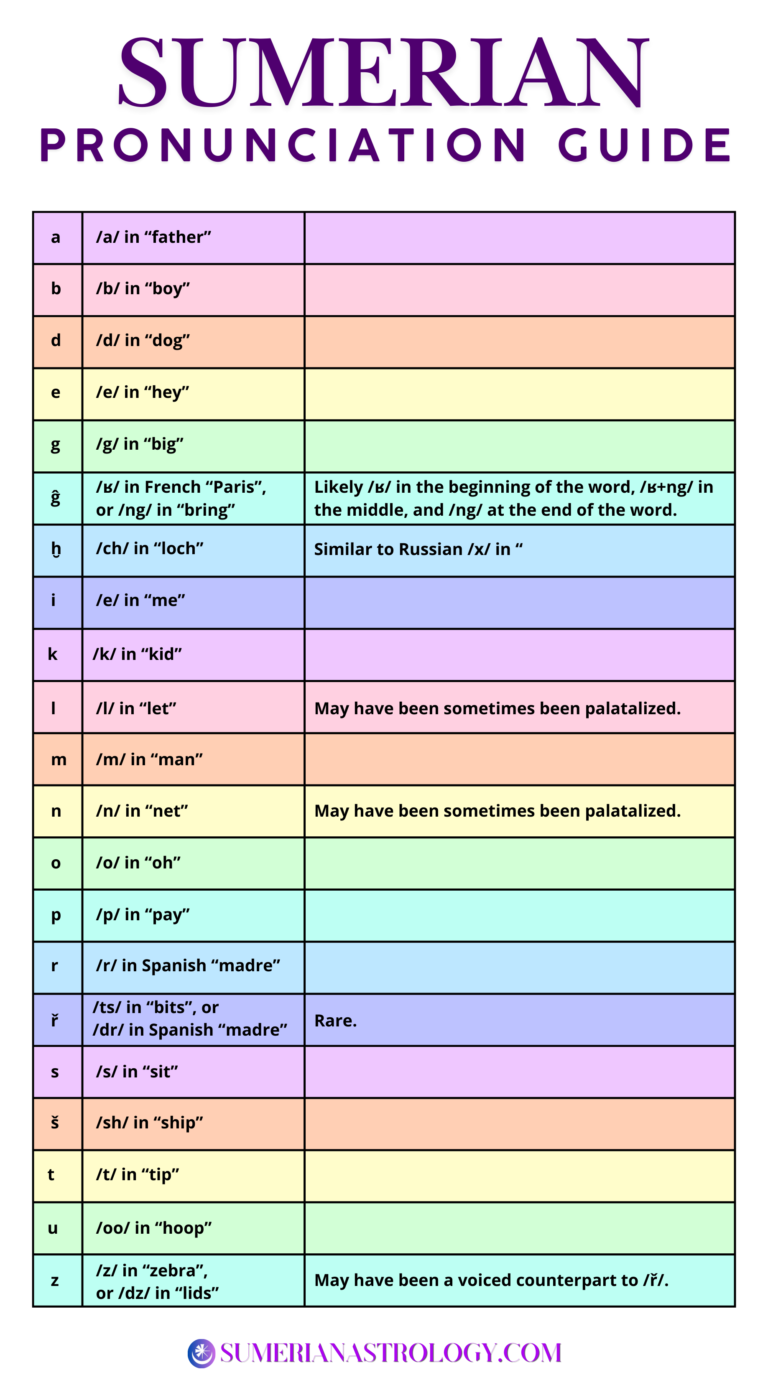Sumerian Lesson 2
How to Pronounce Sumerian
In this lesson, you’ll learn how to pronounce Sumerian, as well as a few Akkadian consonants you may encounter on your Sumerian language journey. While it isn’t critical for learning Sumerian, proper pronunciation sets the amateurs apart from the pros!
Helpful Terms
You can see the full Glossary of Terms here.
transliteration: writing the sounds of one language using the characters or alphabet of another.

What We Know About Sumerian Comes from the Akkadians
One of the most important elements of learning Sumerian, and any language, is mastering pronunciation. Unfortunately, we don’t know with 100% certainty how Sumerian sounded, but we do have a good idea of how Akkadian sounded!
Fortunately, Akkadian scribes were kind enough to transcribe Sumerian using the consonants and vowels of their own language; a process called transliteration.
This is great… until you consider that the Sumerian language had sounds Akkadian didn’t. For example, Akkadians didn’t differentiate between the /g/ and /k/ sound. To them, it all sounded like a /k/. Thus, in some cases, we can only take our best guess as to what Sumerian sounded like.
Pronouncing Sumerian Vowels
While some scholars believe Sumerian had an /o/ vowel (myself included), the evidence is limited and the subject complex. For the sake of simplicity, we’ll be using the four universally accepted Sumerian vowel-sounds, which are pronounced accordingly:
- /a/ like the /a/ in the ‘father’.
- /e/ like the /e/ in the ‘whey’
- /i/ like the /e/ in ‘me’
- /u/ like the /oo/ in ‘boot’
Pronouncing Sumerian Consonants
Standard English Characters
For the most part, Sumerian is transliterated using characters in the English alphabet. In these cases, the letters are likely pronounced similarly to their English equivalent:
- /b/ like the /b/ in ‘boy’
- /d/ like the /d/ in ‘dog’
- /g/ like the /g/ in ‘girl’
- /k/ like the /k/ in ‘kid’
- /l/ like the /l/ in ‘lip’ (may have sometimes been palatalized–make an English /l/ sound, but with your tongue slightly farther back on the roof of your mouth)
- /m/ like the /m/ in ‘man’
- /n/ like the /n/ ‘no’ (may have sometimes been palatalized–make an English /n/ sound, but with your tongue slightly farther back on the roof of your mouth)
- /p/ like the /p/ in ‘peak’
- /s/ like the /s/ in ‘yes’
- /t/ like the /t/ in ‘tip’
- /z/ like /z/ in ‘zebra’ (some have suggested /ts/ as in ‘blitz’ or /dz/ in ‘lids’)
Characters You Might Be Unfamiliar With
While learning Sumerian, there are a few consonants and sounds you’ll encounter which you may be unfamiliar with.
Sounds You Know
While they may look strange, the following characters are used to make sounds quite familiar to the English speaker:
- /ř/ isn’t common in transliteration, but if you do encounter it, it most likely sounds like the /ts/ is ‘bits’, or the /dr/ in the Spanish ‘madre’
- /š/ like /sh/ is in ‘ship’
- /ĝ/ may sound like the /ng/ in ‘bring’, and it might not (we’ll discuss this in the next lesson)
Sounds You May Not Know
English speakers may be unfamiliar with these characters and sounds:
- /ḫ/ like the /ch/ in the German ‘Bach’ (often appears as a standard /h/ in transliteration, despite its guttural pronunciation)
- /r/ like the /r/ in the Spanish ‘pero’ or ‘perro’ (never like the English /r/)
- /ĝ/ like the /r/ in the French pronunciation of ‘Paris’ (we’ll discuss this in the next lesson)

Encountering Akkadian
When reading transliterated texts, especially from later periods, you’ll often come across the following characters which are used to transliterate Akkadian words, and are pronounced as follows:
- /j/ a diphthong or semi-glide, like the /y/ in ‘hey’ (it sometimes appears as /y/, but either way, you won’t see it too often)
- /q/ is an emphatic or guttural /k/
- /ṣ/ is a slightly palatalized /s/ (make an English /s/ sound, but with your tongue slightly farther back on the roof of your mouth)
- /ṭ/ an emphatic or ejective stop /t/
Your Sumerian Language Journey Continues!
Congratulations! You now know how to pronounce Sumerian! In the next lesson, you’ll learn about the Sumerian consonant /ĝ/, which even Zecharia Sitchin didn’t know about, so be sure to subscribe to my substack to get notified as soon as it posts!










